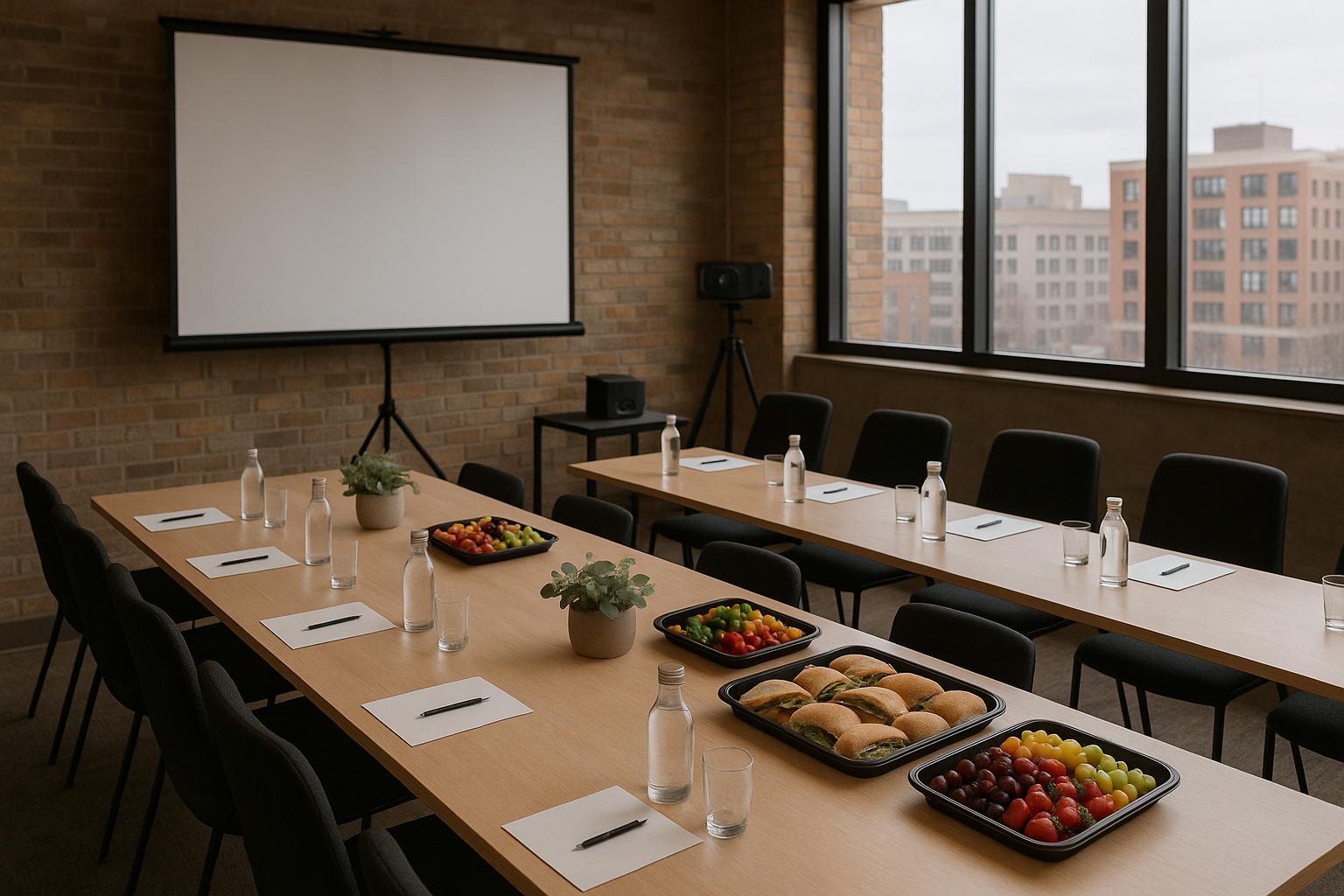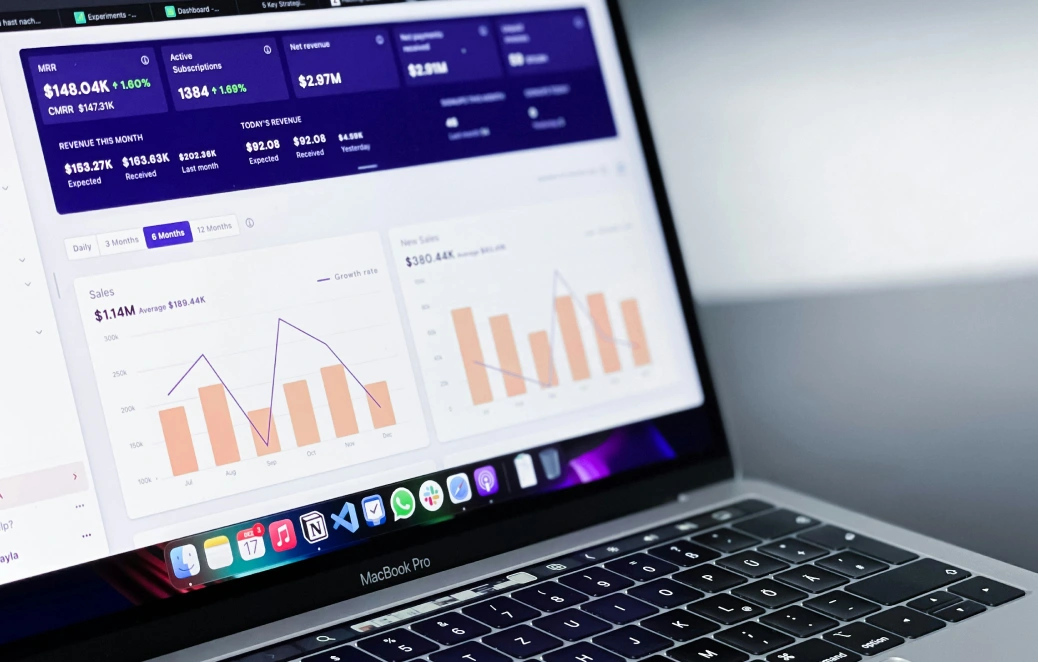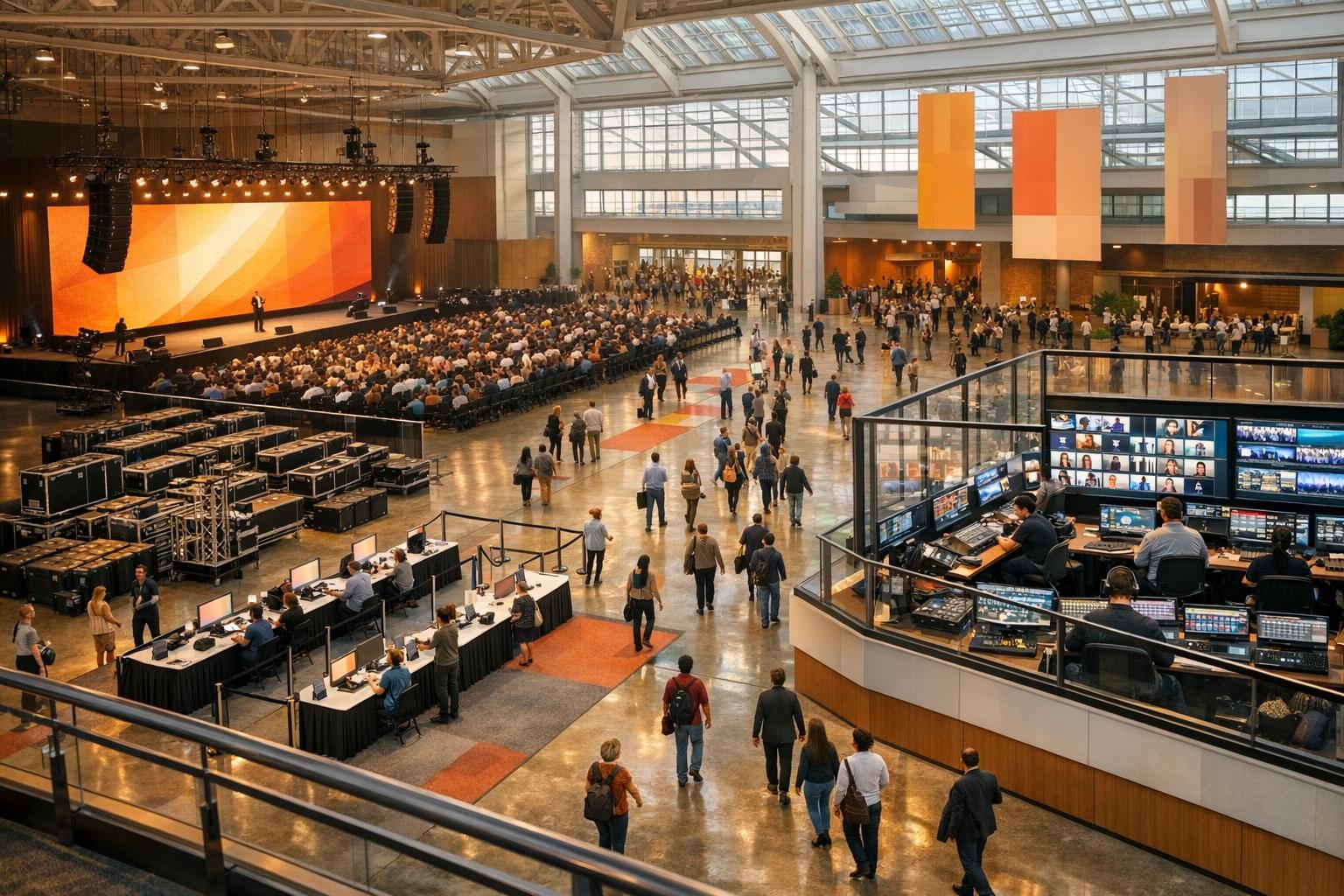Budget-Friendly Meeting Planning Help In The Midwest For Event Production

Chief Executive Officer

Planning a corporate event on a tight budget? The Midwest offers affordable solutions without compromising quality. From lower venue costs to budget-friendly audiovisual services and catering, this region is ideal for cost-conscious planners. Midwest vendors are known for transparent pricing and practical service packages, making it easier to deliver polished events while staying financially responsible.
Key Takeaways:
- Venue Costs: Midwest venues are competitively priced, with options ranging from urban centers like Chicago to smaller cities offering even greater savings.
- Audiovisual Services: Providers like ITA Audio Visual Solutions and Rent-A-Bit offer bundled packages and rental flexibility.
- Catering Options: Straightforward pricing and local partnerships help reduce costs without sacrificing service.
- Seasonal Savings: Off-peak seasons and weekday bookings can further lower expenses.
- Vendor Coordination: Request detailed quotes, prioritize local partnerships, and look for bundled discounts.
With careful budgeting and smart vendor selection, you can host a professional event that meets high expectations without overspending.
Mastering Event Budgets: Saving Costs and Negotiating [Event Insider 32]
Midwest Event Budget Basics
Creating a realistic event budget for the Midwest starts with understanding the main expense categories and the factors that influence costs in the region. A well-thought-out budget not only helps allocate resources effectively but also takes advantage of the Midwest's often lower costs. This breakdown will help you prepare for Midwest event planning while identifying potential savings.
Main Budget Categories for Midwest Events
Here are the primary areas where your event budget will likely go:
- Venue costs: Typically, the largest chunk of your budget will go toward the venue. In the Midwest, these expenses can include rental fees, setup charges, and insurance or security deposits. Cities like Chicago, Minneapolis, and Kansas City offer competitive rates, though prices vary depending on location, amenities, and the time of year.
- Audiovisual and technical production: This category includes equipment rental, staffing, lighting, sound, and projection. Midwest AV providers often bundle these services together, offering attractive pricing compared to other regions.
- Catering and beverage service: Costs here depend on the menu, service style, and the number of guests. Midwest caterers are known for being budget-friendly, with many offering straightforward per-person pricing that includes service charges and gratuities.
- Staffing and logistics: These expenses cover event coordination, registration support, security, transportation, and temporary staff for setup and teardown. Proper staffing ensures your event runs smoothly.
- Marketing and communication: This includes invitations, signage, promotional materials, and digital campaigns to boost attendance.
- Contingency planning: It’s always smart to set aside funds for unexpected costs or last-minute changes. A contingency reserve can keep your event on track if surprises arise.
Regional Cost Factors to Consider
Several regional factors can influence your event budget in the Midwest:
- Seasonal pricing variations: Costs often rise during the busy summer months when demand for venues and vendors is higher. On the other hand, winter months may offer more affordable rates.
- Local tax structures: Taxes vary across Midwest states and cities. Some areas have higher combined state and local taxes, while others benefit from lower rates that can help reduce venue costs.
- Transportation and accessibility: Cities like Chicago, Detroit, and Minneapolis boast major airports with competitive flight options, which could lower travel expenses for attendees. However, some centrally located venues may add costs like parking fees or shuttle services.
- Labor costs: Labor in the Midwest tends to be less expensive compared to coastal cities. This can lead to savings on technical staff, catering teams, and event coordination services, allowing you to maintain quality without overspending.
Budget Allocation Methods
Once you’ve identified your main expense categories, it’s time to think about how to allocate your budget effectively:
- Cost-per-attendee calculations: Divide your total budget by the expected number of attendees to set a per-person spending limit. This method works well for events like corporate meetings with predictable attendance.
- Balancing fixed and variable costs: Fixed costs, like venue rental and AV equipment, remain constant regardless of your guest count. Variable costs, such as catering and transportation, change based on attendance. Knowing this balance can help you adjust spending as your plans evolve.
- Priority-based allocation: Focus your budget on essentials like the venue, AV setup, and catering before considering optional add-ons. This ensures the core elements of your event are covered.
- Regional benchmarking: Comparing costs across Midwest cities can help you set realistic expectations. Smaller markets often offer lower prices than major urban centers, giving budget-conscious planners more options.
Affordable Audiovisual and Technical Production Options
Planning an event on a budget? The Midwest is home to AV providers that offer flexible, budget-friendly solutions for events of any size. Below, we’ll explore some top providers in the region and share strategies to help you save on AV services without compromising quality.
Finding Scalable AV Packages from Midwest Providers
Midwest AV companies are known for their ability to adapt to different event sizes and budgets. Here are a few standout options:
- ITA Audio Visual Solutions: This provider offers all-in-one AV packages, covering lighting, sound, and video production. They also have a wide range of rental equipment to meet diverse event needs.
- Rent-A-Bit: Serving Indianapolis and nearby areas, Rent-A-Bit caters to everything from intimate gatherings with small sound systems to large venues requiring PA systems for thousands of attendees.
- Vantage Production Group: Based in Chicago, this company ensures consistent service no matter the venue, artist, or audience size. Their approach remains the same regardless of the event scale.
- AV For You: Operating out of Minneapolis, this provider is known for its straightforward and affordable rental services. Their packages include delivery, setup, and pickup, making them a convenient choice for conferences and events.
When choosing a provider, it’s wise to ask about their experience with events similar to yours. This ensures they can deliver the right mix of equipment and services tailored to your event’s needs.
Once you’ve selected your AV partner, there are ways to streamline costs while maintaining high standards.
How to Reduce AV Costs Without Compromising Quality
You don’t need to blow your budget to achieve professional AV quality. Here are some practical tips to help you save:
- Focus on the essentials: Prioritize high-quality microphones and clear speaker systems, as strong audio is the backbone of any event.
- Take advantage of bundled deals: Providers like Rent-A-Bit and AV For You offer package deals that can lower costs significantly.
- Customize technical support: Assess the level of on-site support each session requires and adjust accordingly to avoid unnecessary expenses.
- Partner with local vendors: Collaborating with local suppliers can lead to additional savings. For example, Madison Party Rental (MadFoxParty) provides specialized equipment at "very reasonable and affordable" rates, making them a great option for budget-conscious planners.
Budget-Conscious Venue Selection and Vendor Coordination
Stretching your event budget in the Midwest starts with finding affordable venues and vendors. With plenty of wallet-friendly options available, knowing where to search and how to evaluate your choices can make all the difference.
How to Find Affordable Venues in Midwest Cities
Think outside the box with unconventional venues. Many Midwest cities feature unique spaces like revamped warehouses, community centers, or even local schools that double as event locations. These spots often cost less than traditional venues while still offering a memorable setting.
Book during off-peak times. Hosting your event on a weekday or during slower seasons can help you snag lower rates.
Look for bundled packages. Some venues offer packages that include essentials like tables, chairs, lighting, and even setup and breakdown services. These deals can save you money, especially if your event spans multiple days or meets a minimum guest count.
Consider venues with built-in AV setups and explore suburban options. Suburban venues often provide the same amenities as city locations but at a lower cost, with added perks like easier parking and convenience for guests.
How to Evaluate Midwest Vendors for Value and Transparency
Once you’ve narrowed down your venue options, apply the same cost-conscious approach to selecting vendors.
Request detailed quotes. Make sure vendors provide itemized estimates that clearly break down all costs. Avoid those who only offer vague lump-sum pricing without explanations.
Ask about local partnerships. Many Midwest vendors have established relationships with caterers, florists, and transportation providers, which could lead to discounts if you bundle services.
Check contract flexibility. Look for vendors who outline clear policies for changes due to weather, attendance fluctuations, or venue adjustments. Flexibility is key when unexpected issues arise.
Verify backup plans. Reliable vendors should have contingency plans, especially for technical needs like audiovisual equipment. Knowing they have backups in place can save you from last-minute headaches.
Pay attention to communication. Vendors who respond quickly and professionally during the planning stages are less likely to cause surprises later on.
By focusing on these factors, you can ensure your vendors align with the same budget-friendly mindset you apply to the rest of your event planning.
Using a Comparison Table for Venues and Vendors
To make the decision process easier, create a table to compare venues and vendors side by side. Include the criteria most important to your event:
| Criteria | Priority | Venue A | Venue B | Vendor A | Vendor B |
|---|---|---|---|---|---|
| Total Cost | High | Cost Value | Cost Value | Cost Value | Cost Value |
| Location Convenience | Medium | Rating | Rating | Rating | Rating |
| Services Included | High | List of Services | List of Services | List of Services | List of Services |
| Flexibility | Medium | Change Policy | Change Policy | Change Policy | Change Policy |
| References/Reviews | High | Rating | Rating | Rating | Rating |
Assign weights to each criterion based on your priorities and use a scoring system to rank your options. Don’t forget to account for hidden costs like parking fees, security deposits, overtime charges, or cancellation penalties. Also, consider how responsive and professional vendors are during early interactions - this can be a good indicator of how smoothly things will run as your event approaches.
sbb-itb-ae35a94
Practical Tips for Reducing Event Service and Logistics Costs
Cutting event costs doesn’t have to mean sacrificing quality. By making smart choices in catering, transportation, décor, and logistics, you can host a memorable event while staying within budget.
Smart Choices for Catering, Transportation, and Décor
When it comes to catering, consider buffet or family-style meals as more budget-friendly alternatives to plated service. Partnering with local restaurants or food trucks can also provide affordable and unique options, especially for casual or outdoor events. Hosting meals at off-peak times, like breakfast or mid-afternoon, can also significantly reduce food costs compared to lunch or dinner events.
For transportation, look for venues that offer free parking or are easily accessible by public transit. If additional transportation is necessary, local shuttle services often provide group discounts. Don’t forget to ask transit providers about corporate or group rates - they can help keep transportation expenses under control.
Décor doesn’t have to break the bank. Instead of elaborate designs, focus on a few standout elements. Simple centerpieces made with locally sourced, seasonal flowers or branded materials can create an inviting atmosphere without overspending. Many venues already feature attractive design elements, so take advantage of these to minimize the need for additional décor.
The Midwest's natural beauty can also work to your advantage. Spring and summer events can shine with minimal outdoor decoration, while fall gatherings can incorporate seasonal touches like pumpkins or autumn leaves for an authentic, budget-friendly vibe.
Contingency Planning to Stay on Budget
Unexpected expenses can quickly derail an event budget, which is why setting up a contingency fund is essential. Rather than keeping a general reserve, allocate specific amounts for potential issues like weather changes, last-minute guest adjustments, or technical hiccups.
Create tiered backup plans to maintain event quality without overspending. For outdoor events, identify indoor alternatives that don’t require a complete redesign of your setup. When it comes to catering, work with vendors to establish clear agreements on how to handle sudden changes in guest numbers.
Instead of relying heavily on pricey tent rentals, consider venues with built-in covered outdoor areas or flexible indoor-outdoor spaces. Many venues include weather-related clauses in their contracts, which can allow for adjustments without hefty penalties if conditions take a turn.
Building a network of local emergency vendors can also save the day - and your budget. Having reliable backup options for AV technicians, catering, or transportation ensures you’re not stuck paying premium rates for last-minute fixes.
Local Partnerships for Discounted Services
Local partnerships can be a game-changer when it comes to saving money. Midwest business communities are often tightly connected, and vendors frequently collaborate to offer bundled discounts. For example, caterers often have preferred florists or transportation companies they work with. Coordinating services through these partnerships can result in significant savings.
If your organization hosts multiple events throughout the year, consider multi-event agreements with vendors. Many Midwest service providers offer loyalty programs or annual contracts with reduced rates for repeat customers. You can also team up with other local businesses to increase buying power, which might unlock better service packages.
Don’t overlook the resources available through local chambers of commerce. These organizations can connect you with trusted vendors and may even offer member discounts. Midwest cities are known for their strong business networks, making it easier to find cost-effective service providers who understand regional needs.
Finally, take advantage of off-peak booking opportunities. Many vendors experience slower months during winter, and booking multiple services during these times can lead to significant discounts. This approach not only saves money but also helps local businesses maintain steady operations year-round.
Midwest-Based Tools and Resources for Efficient Event Planning
The right digital tools can make event planning smoother, especially when tailored to meet U.S. standards and regional Midwest needs. With smart choices, you can manage budgets in real-time, work seamlessly with local vendors, and stay compliant with state-specific regulations. Here’s how these tools can enhance your event planning process.
Digital Tools for Event Budgeting and Management
Today’s event planning software is designed to address U.S.-specific requirements, such as handling state-specific tax calculations and processing payments in USD. Look for platforms that automatically format dates in the MM/DD/YYYY style and adjust for Midwest time zones.
For budgeting, tools should display costs in USD and account for markup calculations, including local sales taxes. For instance, tax rules in Illinois differ from those in Ohio or Michigan, so flexibility is key. The right platform will handle these variations without requiring manual adjustments.
Vendor management is another critical feature. A good platform should store vendor certifications and licenses, which is especially important for services like AV equipment rentals that may need to meet different safety standards depending on the state or venue.
Collaboration tools are most effective when they integrate with widely used U.S. business software like Microsoft Office 365 or Google Workspace. These tools allow your team to share documents, update budgets, and communicate changes instantly - essential when coordinating with vendors across multiple Midwest time zones.
Reliable performance on major U.S. cellular networks is also a must, whether you're managing an event in downtown Chicago or a more remote part of Wisconsin. These features ensure your planning process stays efficient and your budget remains on track.
Building a Tool Comparison Table for Midwest Event Needs
Once you’ve identified your must-have features, compare tools systematically. Start by focusing on core needs like accurate budget tracking, vendor coordination, compliance capabilities, and integration with your existing systems.
When analyzing costs, go beyond subscription fees. Consider transaction fees, setup costs, and charges for additional users. Many platforms use tiered pricing, but the real expense often includes payment processing fees for vendor payments and client billing. Calculate the total annual cost based on your typical event volume and weigh it against the time savings each tool offers.
Functionality that aligns with U.S. business practices should take precedence over flashy extras. Key features include automated state tax calculations, integration with accounting software like QuickBooks, and the ability to generate reports in standard U.S. formats. Tools that support 1099 reporting for independent contractors can save a lot of time during tax season.
Regional support is another important factor. Look for customer service hours that match Central and Eastern time zones, U.S.-based phone support, and training materials designed for American business practices. Some platforms even offer specialized support for event professionals, which can be a lifesaver when dealing with last-minute changes or technical issues during live events.
Scalability matters if your event program is growing. Choose tools that can handle everything from small 50-person meetings to large conferences with over 1,000 attendees. The best platforms expand with your needs without requiring disruptive system changes or data migrations.
| Evaluation Criteria | Weight | Key Questions |
|---|---|---|
| Budget Management | High | Does it handle multi-state tax calculations and USD formatting? |
| Vendor Coordination | High | Can it store compliance documents and manage multi-state vendors? |
| Integration Capabilities | Medium | Does it connect with QuickBooks, Office 365, or existing business tools? |
| Regional Support | Medium | Are customer service hours aligned with Midwest time zones? |
| Scalability | Medium | Can it handle both small meetings and large conferences? |
| Mobile Functionality | Low | Does it work reliably with major U.S. cellular networks? |
When evaluating platforms, also consider setup and training time. Some tools offer quick-start templates for common event types, while others require more preparation. Factor in the learning curve for your team and any potential downtime during the transition. Even the most feature-rich platform won’t be helpful if your team struggles to use it effectively under tight deadlines.
Finally, ensure the platform complies with U.S. data protection standards and PCI DSS requirements to safeguard attendee information and vendor contracts.
Conclusion: Achieving Budget-Friendly Event Success in the Midwest
Planning a successful corporate event in the Midwest doesn’t require breaking the bank. It’s about smart budgeting and focusing on what truly matters. By working closely with stakeholders, you can clearly outline your event goals and allocate resources to the areas that count most.
Start by distinguishing between fixed costs - like venue rentals and AV packages - and variable costs, such as per-person catering or additional equipment rentals. This approach helps you identify areas where you can negotiate and ensures your budget stays on track.
Don’t forget to set aside a contingency fund. Unexpected costs can pop up, and having a financial cushion gives you the flexibility to handle surprises without derailing your plans.
Every thoughtful choice, from managing fixed versus variable costs to preparing for the unexpected, brings your Midwest event closer to success - without overspending.
FAQs
How can I negotiate lower venue costs for corporate events in the Midwest?
To cut down on venue costs in the Midwest, start by being clear about your budget and open to adjusting your event dates. Opting for off-peak seasons, weekdays, or less busy times of the year can help you save a lot. Ask venues about bundled packages that include services like catering or audiovisual equipment - this can often lower the overall price.
When negotiating, make sure to ask about any hidden fees or extra charges to avoid surprises later. Building a good relationship with venue managers and showing a willingness to compromise - like adjusting setup times or being flexible on room preferences - can also work in your favor. The key to staying within budget while hosting a polished event lies in clear communication and adaptability.
How can I find budget-friendly audiovisual services in the Midwest that still deliver professional quality?
When planning audiovisual services for your event, finding the right balance between quality and budget is key. Start by researching trusted providers in the Midwest known for their affordability and professionalism. Prioritize vendors that offer customizable packages and end-to-end support to meet your specific event requirements. Always request detailed quotes to get a clear picture of costs and avoid unexpected expenses.
Customer reviews and testimonials are a great way to assess a provider's reliability and the quality of their services. Look for companies that deliver cost-conscious solutions without compromising on the quality of their equipment or production services. This approach helps ensure your event runs seamlessly while staying within budget.
How can working with local vendors in the Midwest help save money when planning corporate events?
Partnering with local vendors in the Midwest can be a smart move for cutting costs. By working with nearby providers, you can avoid the travel and accommodation expenses that often come with hiring out-of-town vendors. Plus, many local vendors offer bundled services, making it easier to manage your planning while keeping expenses in check.
Another bonus? Local vendors are often willing to negotiate discounts, especially if you’re planning a large event or plan to work with them regularly. Building strong relationships with these professionals not only improves collaboration but also gives you access to reliable, budget-conscious services that align perfectly with your event's needs.
Related Blog Posts








